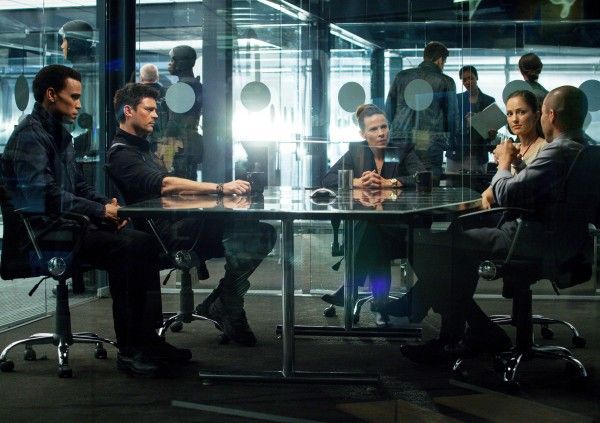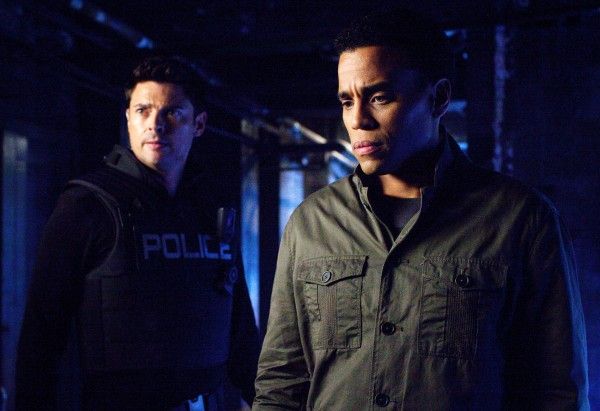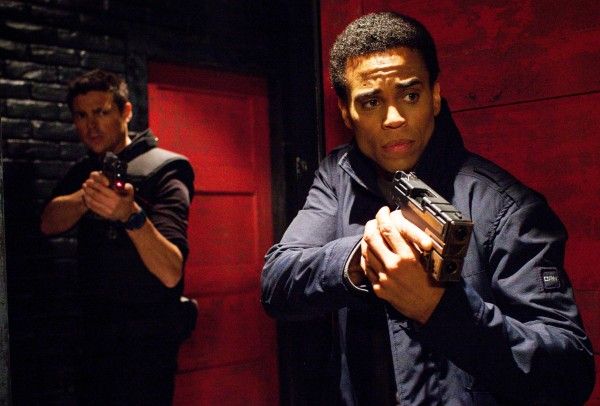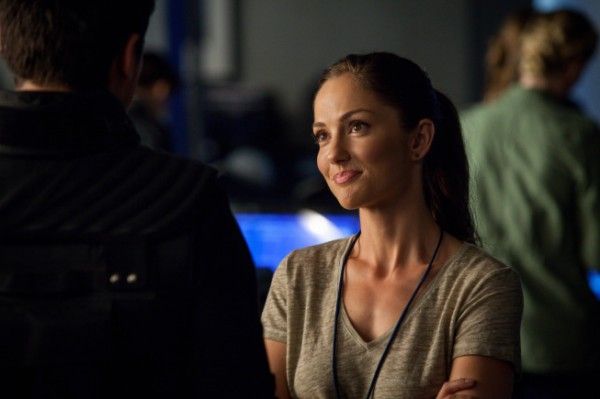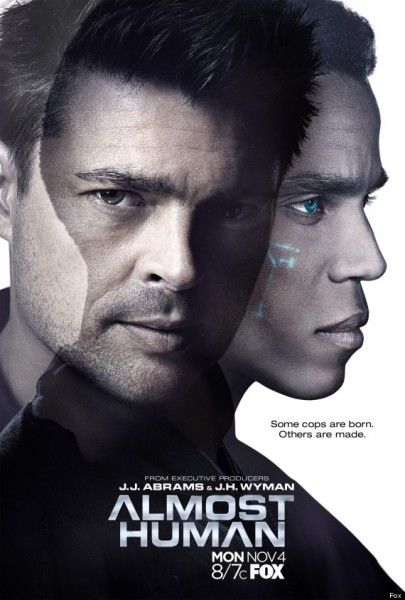The Fox series Almost Human, from creator J.H. Wyman (Fringe) and executive producer J.J. Abrams, is a high-tech, high-stakes action drama set 35 years in the future, when police officers are partnered with highly evolved human-like androids. An unlikely and intriguing partnership is forged when part-machine cop, John Kennex (Karl Urban), is forced to pair with the part-human android, Dorian (Michael Ealy), to investigate what is clearly a deep cover-up. The show also stars Lili Taylor, Minka Kelly, Mackenzie Crook and Michael Irby.
During this exclusive interview with Collider, executive producer J.H. Wyman talked about how much the series has evolved from the pilot, that he likes to plan out exactly where he’s taking the arc of a story, how important it is for him to portray a hopeful interpretation of the future, staying true to the larger picture, how each of the main characters essentially have their own full-length feature film, unspooling in episodic segments, and that he had a five-year plan for the show. Check out what he had to say after the jump.
Collider: How much did this show change from pilot to series, once you thought about where you’d like to take things?
J.H. WYMAN: The way that I work is that I try to work in metaphors, and you can’t write a metaphor unless you know where you’re going, so I always think about the future. A lot of people plan for failure, but they don’t plan for success, and that’s a big problem, especially in the TV world ‘cause you’re trying to find out what your show is. So, JJ [Abrams] and I talked about it, at great length. We had certain things we wanted to represent, certain things we didn’t want to fall into, and certain things that we wanted to change and try. Ultimately, it came out where the entire reason for this show, in five years, became apparent to us. Then, it’s a matter of getting the writers together and figuring out what the episodes are, but those are just thematic.
I would much rather have somebody say, “You know what? I just didn’t like what you were doing,” then say, “They didn’t know what they were doing.” I know what I’m doing. If it’s going to be bad, or if it’s great, it’s me, in either case. It took me a long time to get to a position where I can feel that, with my art, I’m capable of saying what I need to say, and once I finish it, I can sit back and say, “It’s done, and I’m okay with that. People can judge it good or bad, and it doesn’t matter. I’m okay with it because I said something I needed to say.” That’s a really hard place to get, as an artist. So, I can live with people saying, “I didn’t like it.” But I can’t live with people saying, “There just seems to be no plan here,” ‘cause there is a plan. And a lot of people fall into that, where they don’t know what their show is yet. Their pilot gets picked up, and they have to figure it out. I would hate to be in that situation.
Was important to you to make sure that the futuristic aspect of this world felt possible and like the next natural progression?
WYMAN: I believe it is. There were a couple of things that got me thinking about this. One is that I’m a little bit frightened of technology and leaving humanity behind. I just was confused why all these great writers, who had influenced me to such a great degree, like [Isaac] Asimov and [Philip K.] Dick, always had this interpretation of the future that was so dark and dour. I just have a different impression of the human race. I think we’re really resilient. I think there are a lot of cynical people out there right now, and probably for good reason. But I think that ever cynic is really a damaged romantic, and they really, really, really want things to be good. And if that’s the case, I don’t need to tell a story that says, “Humanity, look what you’ve done. Now you can’t go out. There’s no sun. Look how you’ve wrecked the world.” That’s not me. That’s not my job.
What I what to talk about is something different. I want to talk about hope. Are we going to be completely lambasted by things we don’t see coming? Yeah. Is it going to damage the human race and hurt us? Probably many times. Are we going to get over it? Absolutely. Are we going to move through it? Yes. I believe in the human spirit. And usually the people who are following me – my fans and things like that – are like-minded people, in that regard. They like to hear about people being in pain, but that are okay, and people feeling like they can’t go on, but then they find a reason to go on. How do you marry someone and love them, and then they die? How does that happen? Why are we on this journey? They want to talk about things, and they want to understand. So, this is the perfect vehicle for that. The future that I see celebrates those types of like-minded ideals and ideas. I don’t know what’s coming, but I know that we’re not going to get knocked out so easy.
When you like to keep a feeling of hope to your work, does it make it more difficult for you to kill off a character when you need to?
WYMAN: It’s funny that you say that. If you take, for example, when Etta died in Fringe, people were so upset. It was awesome! Number one, it was good because I knew they were feeling something, which was important. They were invested in her. But number two, they didn’t realize the larger picture, which I found alarming. Here is a woman that was born of two, essentially, warriors, who dedicated her entire life to bring her parents back to the living, so that they could save the world. If you asked that character, “Are you willing to give your life up for this cause?,” her answer would be, “Yes, 100%. I would do it in a minute.”
The whole message of the piece was that possessions are transient. You don’t know if you are going to be able to have time with somebody, so you better be careful. She served her purpose in destiny, and she moved on. Ultimately, at the end of the show, we got her back. It was difficult to write when she died, and the way she died was extremely difficult to watch, perpetrated by such a terrible character. It effected people, but tragedy is a part of life. Life is painful sometimes. It touches everyone, so you may as well try to look for other answers and find peace. So, it is difficult to write those types of things because nobody wants to tell sad stories. I think that I’ll always tell stories about human hope. I would love to be able to tell somebody, “It’s okay. It’s all right. Be a good person.” That’s what my job is, in life.
Did you want this show to have a similar look and feel to Fringe, even though it is a very different show?
WYMAN: There’s a reason why the crime looked Fringe-y. I wanted people to say, “Oh, they’re back. That’s cool. They’re going to tell really interesting stories, every week, about great cases, and we’re going to learn more about these great people.” But, there’s a poetry that Fringe had, uniquely. There’s a certain poetry that I always inject. Some people don’t like it and some people do, but I like it and that’s the way I like to tell stories. That will always be there.
You have so many interesting characters on this show. Will we continue to learn more about who they are, personally?
WYMAN: Yeah. We took great pains to design these people. Essentially what’s been designed is five feature films for each character. Each character has a very in-depth feature film that you’re gonna see segments of, and you’re going to start to invest in these people. They’re all remarkable, in their own way. Whether they’re fighting a trial that you didn’t realize they were fighting, whether they reveal themselves to be more like you than you’d expect, or whether they reveal some secret, you’re going to invest in them. Each one of them was carefully designed to make sure they represented a very big portion of the thematic elements of this show, and they’re up against things.
What does it take to get up every morning in a world where you see the things that they see, every day? And they do it for us, so that we can sleep well. And then, imagine, exponentially, that crime is really scary. What kind of person gets up that? Who gives up a family to be a very strong female, like Lili Taylor? She’s not defined by any counterpart. She’s got her own view of the world, and what she’s going to give in it, and what’s she’s gonna sacrifice, and what those sacrifices mean to her. Those things are going to become apparent. You’re going to get to understand who these people are. If you want a novel, you have to wait. I will write you a novel. Just let me unspool it. Even the greatest novelist in the world, in my opinion, who ever existed, [Charles] Dickens, did it in segments. So, you will get all of that.
How crucial was the casting for this, and getting such an incredible cast together?
WYMAN: It was very important. Each of them are literally incredible human beings. I’m so fortunate. I met Karl [Urban] through JJ and Bryan Burk, ‘cause they were doing Star Trek. We were talking about the show, and I was like, “Well, I want a guy like this,” and Bryan Burk said, “What about Karl Urban?” I was like, “Oh, my god, that’s pretty cool.” And JJ said, “He’s great!” So, I talked to him on the phone for three hours. After the phone call, he was like, “I’m in!” We were like, “Great, let’s do it together!” And Michael Ealy was a bit of a tougher sell. I had to sit down and express to him what my thoughts were and what I was doing with the program. He’s putting himself out there a little bit, but he finally agreed. We had a three-hour meeting, and I left thinking, “Shit, I have to have him,” and he was like, “Shit, I have to be on this show.” And then, Minka Kelly was all natural. I wanted to do something very specific with that character, and only she could do it. I meant that. I was very fortunate that the dice landed in a way that she was incredibly compelled and wanted to do it. When I told her what it was, she just dove in, head first.
Do you have a five-season plan for this show?
WYMAN: Yep. That’s how I did Fringe. Every year, I have an overall plan, but I have an understanding of where I’m designing to go, season to season. It’s so crucial because you can’t write a metaphor unless you know where you’re going. Some people are really good at making it up as they go. I’m just not one of them. I have to think and stare at a wall for six hours. That’s my fate.
Almost Human airs on Monday nights on Fox.

